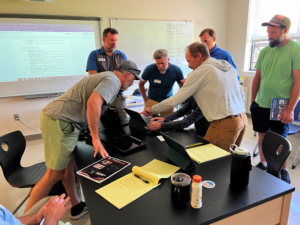 After 20 years as a K-12 island educator, I often experienced the joy of student learning. Now that I mostly work with adults, I find myself missing the outward display of happiness that young students exhibit in a learning setting. While adults certainly experience joy when they learn something new, it is often a more subdued response, especially in formal settings like classrooms and professional development sessions. Recently, however, I was fortunate to witness that child-like excitement once again with a group of adult learners who were genuinely energized and engaged. This was a rare privilege and one of the highlights of my summer.
After 20 years as a K-12 island educator, I often experienced the joy of student learning. Now that I mostly work with adults, I find myself missing the outward display of happiness that young students exhibit in a learning setting. While adults certainly experience joy when they learn something new, it is often a more subdued response, especially in formal settings like classrooms and professional development sessions. Recently, however, I was fortunate to witness that child-like excitement once again with a group of adult learners who were genuinely energized and engaged. This was a rare privilege and one of the highlights of my summer.
As an organization dedicated to the long-term goal of electrifying Maine’s working waterfront, Island Institute convened a team of partners to develop a pioneering two-part education and training initiative to address the growing demand for skilled technicians in the electric boating industry. The Level 2 course was created with boatyard technicians in mind but was designed for a wide range of expertise.
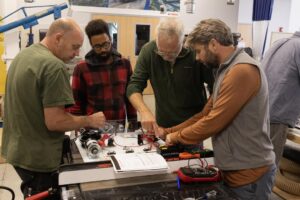 The course was offered twice: first in Rockland at the Mid-Coast School of Technology (MCST) in July, and then in Farmington at the Foster CTE Center in August. After more than a year of planning and development, it was thrilling to launch the course and see the positive outcomes. Nearly all participants rated the course as good or excellent, and every single one successfully completed the assessment, earning a digital badge from Kennebec Valley Community College (KVCC). Organizing such a collaboration involves many moving parts and significant effort. My behind-the-scenes role was to coordinate with our partners KVCC and MCST to keep everything on track. Once it was ‘game time’, I got to sit back and watch the magic our amazing instructors Dan Hupp and Joel Rowland created with their students.
The course was offered twice: first in Rockland at the Mid-Coast School of Technology (MCST) in July, and then in Farmington at the Foster CTE Center in August. After more than a year of planning and development, it was thrilling to launch the course and see the positive outcomes. Nearly all participants rated the course as good or excellent, and every single one successfully completed the assessment, earning a digital badge from Kennebec Valley Community College (KVCC). Organizing such a collaboration involves many moving parts and significant effort. My behind-the-scenes role was to coordinate with our partners KVCC and MCST to keep everything on track. Once it was ‘game time’, I got to sit back and watch the magic our amazing instructors Dan Hupp and Joel Rowland created with their students.
The 23 students were a diverse group that included women, younger adults in their 20s and 30s, and Mainers born and raised in other countries. Several students with deep experience in the content generously shared their knowledge with the group. It was inspiring to see everyone, from oyster farmers considering electric outboards for their farms to experienced mariners new to battery power, come together around a common interest.
“The best part of the course was actually the open dialogue and mix of skills and knowledge.”
According to one student, “The best part of the course was actually the open dialogue and mix of skills and knowledge.” The format of the two-day boot camp included lectures on the theory and principles of electricity and electric propulsion fundamentals each morning. It was fascinating to listen to these discussions, which ranged from highly technical to inspirational and aspirational.
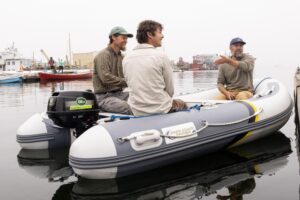
In the afternoons, students alternated between labs and sea trials. In Rockland Harbor and a lake in Farmington, students tested an Elco electric outboard on a RIB (rigid inflatable boat). The concept of “seeing is believing” proved to be a powerful teaching tool. Students experienced the benefits of electric outboards, including their clean and quiet operation, and observed the performance of the battery power. After spending a few hours on the water, we tracked our usage with an app and found that we used very little of the battery’s total capacity.
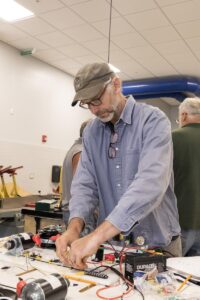
“Having the opportunity to speak with fellow students and colleagues in open discussion during class was invaluable. This was a great introductory to the many subjects that are involved in electric propulsion.”
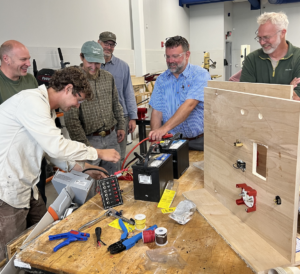
The electric boat course is part of the Island Institute’s effort to reduce greenhouse gas emissions in the marine sector by promoting the electrification of Maine’s working waterfront. This work includes deploying demonstration electric boats to several Maine harbors and marine businesses, supporting shoreside solar-powered charging stations on docks and wharves, helping fishermen and aquaculture farmers fund clean energy projects, and more.
Stay tuned for the third round of the course this fall in Washington County. If you would like to receive registration information, contact Yvonne Thomas at ythomas@islandinstitute.org. Next time you’re by a working waterfront, keep an eye out for electric outboards. If you see a few, you’ll be witnessing the beginning of a growing trend, and will know there are now more skilled hands along the coast ready to maintain and repair them.

